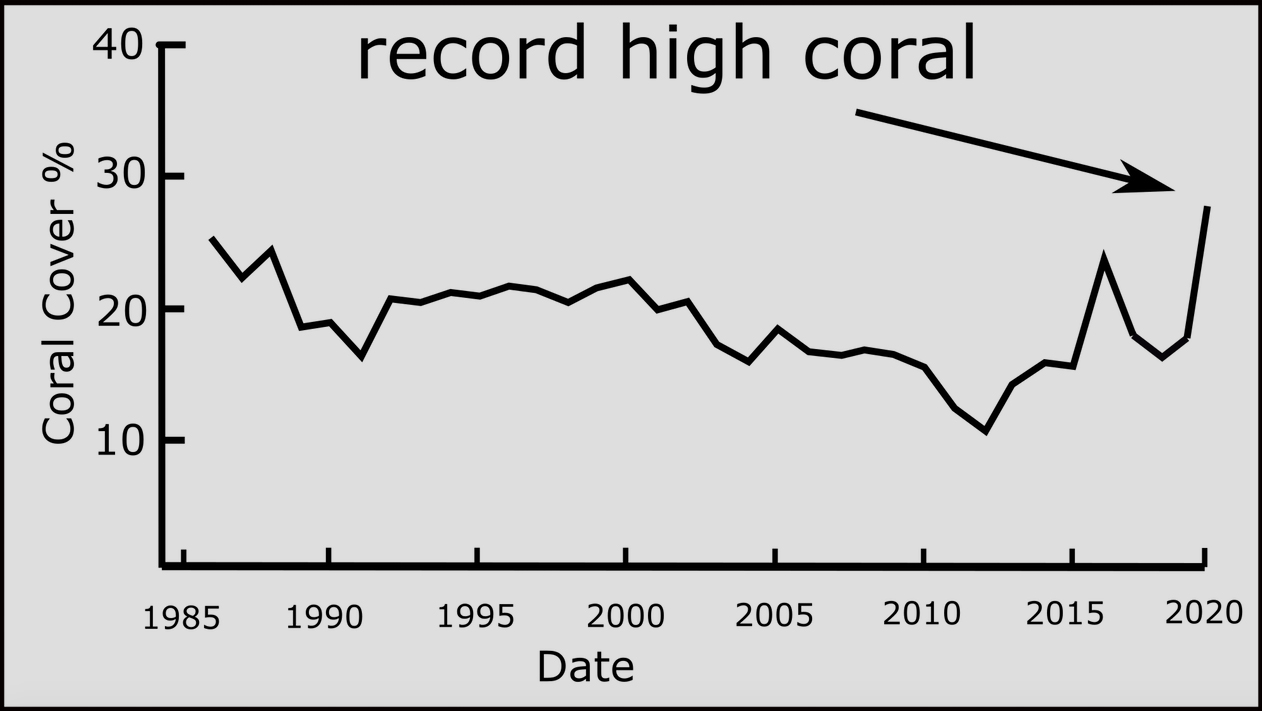Table of Contents
Like Mark Twain, polar bears and the Arctic ice cap, the death of the Great Barrier Reef has been greatly exaggerated.
The Reef has long been up there with polar bears as one of the great poster children of climate alarmism. The supposed threat to the Reef is one of the chief claims of alarmists trying to stop mining projects in Queensland and ludicrous court cases that aim to hamstring Australian governments for the foreseeable future.
But, like almost every other claim of the climate alarmists, it’s complete bullshit.
The Reef is doing better than ever.
The annual data on coral cover for the Great Barrier Reef, produced by the Australian Institute of Marine Science, was released on Monday showing the amount of coral on the reef is at record high levels.

The Reef has been under “imminent threat” for as long as I can remember, whether from introduced starfish or farm pesticides. Each has proved to be yet another false Cassandra.
Like all other data on the reef, this shows it is in robust health. For example, coral growth rates have, if anything, increased over the past 100 years, and measurements of farm pesticides reaching the reef show levels so low that they cannot be detected with the most ultra-sensitive equipment.
This data is good news. It could hardly be better. But somehow, our science organizations have convinced the world that the reef is on its last legs. How has this happened?
One reason is that occasionally colossal amounts of coral are killed, mostly by cyclones, but also by the crown of thorns starfish and bleaching.
So the media, with its predilection for bad news, can be fed a regular diet of doom. Our scientists are always happy to oblige.
Alarmism keeps the government grants rolling in, after all. Any scientist who is gauche enough to say, “Hey, everything’s fine” is immediately going to face the question: “So, why should we keep funding you?”
Serious study of the Reef began in the 1970s, when the threat of the Crown of Thorns starfish first grabbed headlines.
It was reasonable in the ’70s to be concerned about these plagues and they ultimately precipitated AIMS’ long-term monitoring of coral and starfish in the ’80s.
I was working at AIMS when this important work started, and it is interesting to look back on what has changed.
The coral cover is no less, the number of starfish is no more, but the number of scientists and managers working on the reef has exploded. Perhaps this is the problem.
The bigger problem is that too many scientists are unable to distinguish between science and activism. For an activist, a problem solved is an existential crisis. For a publicly-funded scientist, good news is an invitation to funding cutbacks.
The science institutions have been claiming that there have been three disastrous bleaching events in the past five years, which does not accord with the latest statistics[…]So the reef has had roughly one event in 15 years, and most of the coral on the reef did not bleach and most that bleached did not die. Therefore, it is not surprising that the reef is in good shape.
Still, never bet on a trougher going down quietly. Nothing squeals quite like a taxpayer-funded pig dragged from the trough.
The bad news is that the record high coral cover means it is likely that coral cover will decline in the next few years.
Prepare for the headlines saying the reef has lost much of its coral and is indicative of climate change and farmers polluting the reef. And the reef will be predicted to be gone by 2050 – or whenever.
Climate Change Dispatch
I’m sure it will disappear around about the same time as the polar bear.
Please share this article so that others can discover The BFD









